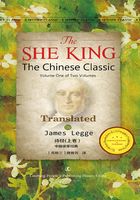
TS'AOU-CH'UNG
1 Yaou-yaou went the grass-insects,
And the hoppers sprang about.
While I do not see my lord,
My sorrowful heart is agitated.
Let me have seen him,
Let me have met him,
And my heart will then be stilled.
2 I ascended that hill in the south,
And gathered the turtle-foot ferns.
While I do not see my lord,
My sorrowful heart is very sad.
Let me have seen him,
Let me have met him,

St.3. 被 is described as 首飾, 'an ornament for the head', and as being made of hair plaited. It was probably the same with what is elsewhere called the 副, though Ying-tah identifies it with the次. 僮僮 (written also without the人at the side) is defined by Maou, as竦敬, 'standing up high and reverently'. Then 祁祁 in L.3, is said to be 舒遲貌, 'the appearance of leisurely ease'. Both the predicates belong in the construction to the head-dress; in reality to the lady.—夙夜 is not'from morning till night', as Lacharme takes it, but early in the morning, while it was yet dark (夙夜, 非自夙至夜, 乃夜之夙也, 昧晦未分為夜, 天光向辰為夙).The 公 in I.3=公所, 'the prince's place' the temple oflast st. It must not be taken, says Choo, of 'the prince's private chamber'.
The rhymes are—in st. 1, 沚, 事, cat.1, t.2: in 2, 中,宮, cat.9; in 3, 僮, 公, ib.; 祁, 歸, cat. 15, t. 1.
NOTE ON THE INTERPRETATION. The interpretation of the ode above given is satisfactory enough. Choo mentions another, however, which would also suit the exigencies of the case pretty well;—that it refers to the duties of the prince's wife in his silk-worm establishment. The fan would be useful in this, as a decoction from its leaves, sprinkled on the silkworms' eggs, is said to facilitate their hatching. The imperial editors fully exhibit this view, but do not give it the preference. Le Kwang-te (李光地; of the pres. dyn.) adopts it in his 詩所, and takes no notice of the other.
Ode 3. Narrative. THE WIFE OF SOME GREAT OFFICER BEWAILS HIS ABSENCE ON DUTY, AND LONGS FOR THE JOY OF HIS RETURN. All the critics agree that the speaker is the wife of a great officer. According to Choo's view, she speaks as she is moved by the phenomena of the different seasons which she observes, and gives expression to the regrets and hopes which she cherished.

And my heart will then be pleased.
3 I ascended that hill in the south,
And gathered the thorn-ferns.
While I do not see my lord
My sorrowful heart is wounded with grief.
Let me have seen him,
Let me have met him,
And my heart will then be at peace.


He compares the piece with the 3d and 10th of the last Book. The different view of the older interpreters will be noticed in the concluding note.
St. 1. L1.1,2. 喓 (The Shwoh-wăn does not give the character) 喓 is intended to give the sound made by the one insect; and 趯趯 represents the jumping of the other. What specific names they should receive is yet to be determined. I have meanwhile, translated 草蟲 literally. It is described as 'a kind of locust, green and with a wonderful note'. The pictures of it are like the locusta viridissima. The 阜螽 is, probably, the common grasshopper;—Seu Ting (徐鼎; of the time of K'een-lung) says there can be doubt of it (蚱蜢無疑也). The Urh-ya calls it 蠜, and the former 負蠜, or'carrier of the fan'. These names arose from the belief that when the one gave out its note, the other leaped to it, and was carried on its back. 'They thus', says K'ang-shing, 'sought each other like husband and wife'. This is the foundation of the old interpretation of the piece.L. 4, in all the stanzas. 忡忡= 'to be agitated' as if it were 衝衝. The Shwoh-wăn explains both 忡 and 惙by 憂. The predicates in all the three stanzas rise upon each other, as do those in the concluding lines. L1.5.—7. Of亦and止we can say nothing but that they are two particles untranslateable; one initial, the other final.So, Wang Yin-che. The turn in the thought, indeed,make 亦= 'but'.
St. 2, 3. L.2. 蕨 and 薇 are both ferns. Williams says on the former:—'An edible fern; the stalks are cooked for food, when tender, and a flour is made from the root. The drawing of the plant resembles an aspidium.'Choo says, 'The wei resembles the keuch, but is rather longer; it has spinous points and a bitter taste. The people among the hills eat it.' The keuch is also called 鼈 and 鼈腳, as in the translation.
The rhymes are—in st. 1, 蟲, 螽, 忡, 降, cat. 9: in 2,蕨, 惙, 說, cat. 15, t. 3: in 3, 薇, 悲, 夷, ib. t. 1.
NOTE ON THE INTERPRETATION. The old interpreters say, like Choo, that the subject of the ode is 'the wife of a great officer'; but they make the subject of her distress, not the absence of her husband, but the anxiety incident to the uncertainty as to the establishment of her state as his acknowledged life. According to the customs of those days, ladies underwent a probation of 3 months after their 1st reception by their husbands, at the end of which time they might be sent back as 'not approved'. The lady of the ode is supposed to be brooding during this period over her separation from her parents; and then anticipating the declaration of her husband's satisfaction with her, which would be an abundant consolation. I have noticed the allusion in the 1st two lines of the 1st st., which may be tortured into a justification of this view; but the other stanzas have nothing analogous. The interpretation may well provoke a laugh. The imperial editors take no notice of it.

